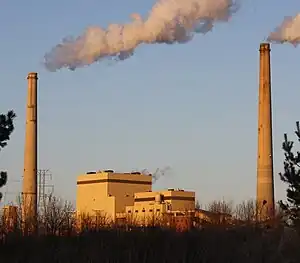Edgewater Generating Station
Edgewater Generating Station is a 380 megawatt (MW) coal power plant located on the south side of Sheboygan, Wisconsin, on the shore of Lake Michigan, whose waters are used to provide cooling. It provides electricity for customers in the northeastern part of Alliant Energy's Wisconsin Power & Light service area and service to several local municipal utilities. In 2009, it was the seventh largest generating station in Wisconsin, with a net summer capacity of 767 MW.[1]
| Edgewater Generating Station | |
|---|---|
 | |
| Country | United States |
| Location | Sheboygan, Wisconsin |
| Coordinates | 43°42′56″N 87°42′23″W |
| Status | Operational |
| Commission date | Unit 1: 1931 Unit 2: 1941 Unit 3: 1951 Unit 4: 1969 Unit 5: 1985 |
| Decommission date | Unit 3: 2015 Unit 4: 2018 |
| Owner(s) | Alliant Energy (majority) WEC Energy Group (minority) |
| Thermal power station | |
| Primary fuel | Coal |
| Turbine technology | Steam turbine |
| Cooling source | Lake Michigan |
| Power generation | |
| Nameplate capacity | 380 MW |
| Capacity factor | 69.41% (2021) |
| Annual net output | 2311 (2021) |
| External links | |
| Commons | Related media on Commons |
Units
| Unit | Capacity (MW) | Commissioning[2] | Notes |
|---|---|---|---|
| 1 | 30 | 1931 | Retired[3] |
| 2 | 30 | 1941 | Retired[3] |
| 3 | 60 (nameplate) 70.8 (summer) 71.7 (winter) [3] |
1951 [3] | Retired[4] Cyclone Boiler 844 million British thermal units per hour (247 MW) |
| 4 | 330 (nameplate) 320.4 (summer) 320.7 (winter) [3] |
1969 [3] | Retired[5] Cyclone Boiler 3,529 million British thermal units per hour (1,034 MW) |
| 5 | 380 (nameplate) 413.6 (summer) 414.3 (winter) [3] |
1985 [3] | Pulverized Dry Bottom Boiler 4,366 million British thermal units per hour (1,280 MW) |

In 1952 one of the units was upgraded with a Babcock & Wilcox cyclone boiler. At the time, the facility was using a 50/50 mix of Illinois and West Virginia coal. The West Virginia coal was shipped via lake freighter from Lorain, Ohio.[6]
At present, coal is delivered to the plant entirely by railroad, originating primarily from the Powder River Basin in Wyoming, via a Union Pacific spur line that was originally the main line of the Milwaukee Northern interurban railway.
Unit 3 and 4 share the same chimney.
Unit 3 turbine and generator were manufactured by Allis-Chalmers. Unit 4 was manufactured by General Electric, with an Alterrex excitation system. Unit 5 was also manufactured by General Electric, with a Generrex excitation system.
Retirement and decommissioning
Unit 3 was retired at the end of 2015 due to its age and efficiency.[4] Unit 4 was retired in 2018 as Alliant Energy worked to reduce 80 percent of carbon dioxide emissions by 2050. Unit 4's electricity generation would be replaced by Riverside Energy Center in the Town of Beloit, which uses natural gas.[5]
On May 22, 2020, Alliant Energy announced that the plant would be decommissioned by the end of 2022, and the property would be redeveloped for another use; Unit 5's generating capacity has also been replaced by a further expansion of Riverside.[7] On June 23, 2022, Alliant announced that Edgewater's decommissioning date would be delayed until June 2025, due to the ongoing supply chain issues and to hedge against an energy shortage in upcoming years, with Edgewater mainly being in service during peak periods.[8] The utility also plans a 99 MW battery by 2024.[9]
Electricity generation
In 2021, Edgewater generated 2,311 GWh, approximately 3.7% of the total electric power generated in Wisconsin (62,584 GWh)[10] for that year. The plant had a 2021 annual capacity factor of 69.41%.
| Year | Jan | Feb | Mar | Apr | May | Jun | Jul | Aug | Sep | Oct | Nov | Dec | Annual (Total) |
|---|---|---|---|---|---|---|---|---|---|---|---|---|---|
| 2001 | 421,123 | 444,173 | 446,782 | 261,305 | 290,120 | 404,445 | 432,472 | 488,116 | 349,327 | 449,850 | 422,409 | 434,451 | 4,844,573 |
| 2002 | 453,762 | 399,382 | 273,143 | 306,503 | 389,155 | 419,313 | 490,968 | 429,073 | 407,380 | 408,755 | 390,591 | 418,889 | 4,786,914 |
| 2003 | 298,900 | 456,077 | 299,103 | 455,488 | 439,803 | 396,437 | 466,353 | 473,587 | 353,381 | 399,188 | 436,408 | 419,095 | 4,893,820 |
| 2004 | 462,658 | 251,202 | 269,249 | 343,218 | 411,550 | 436,325 | 479,183 | 445,972 | 419,681 | 442,563 | 377,296 | 420,811 | 4,759,708 |
| 2005 | 468,022 | 392,173 | 383,075 | 396,735 | 346,578 | 398,064 | 288,539 | 318,025 | 307,563 | 287,223 | 327,345 | 381,344 | 4,294,686 |
| 2006 | 264,155 | 296,154 | 370,761 | 366,110 | 439,882 | 399,024 | 466,530 | 413,755 | 395,309 | 239,629 | 255,995 | 373,906 | 4,281,210 |
| 2007 | 468,131 | 452,671 | 462,173 | 364,453 | 224,700 | 335,228 | 403,344 | 428,599 | 362,483 | 436,604 | 408,099 | 399,996 | 4,746,481 |
| 2008 | 422,307 | 396,314 | 442,794 | 262,068 | 392,238 | 373,217 | 425,015 | 418,498 | 366,491 | 314,885 | 391,390 | 412,731 | 4,617,948 |
| 2009 | 450,697 | 332,405 | 290,450 | 251,222 | 245,074 | 344,625 | 332,379 | 377,838 | 322,644 | 404,683 | 322,968 | 413,297 | 4,088,282 |
| 2010 | 380,309 | 394,406 | 378,866 | 248,360 | 409,800 | 400,273 | 435,301 | 446,457 | 335,137 | 285,028 | 229,764 | 370,602 | 4,314,303 |
| 2011 | 471,011 | 418,396 | 448,811 | 302,188 | 416,251 | 375,186 | 463,703 | 415,892 | 283,651 | 263,322 | 206,532 | 287,278 | 4,352,221 |
| 2012 | 299,981 | 317,445 | 329,228 | 154,216 | 210,855 | 277,757 | 431,796 | 379,885 | 225,366 | 189,953 | 409,706 | 371,978 | 3,598,166 |
| 2013 | 347,716 | 246,618 | 452,454 | 461,179 | 402,119 | 334,988 | 409,965 | 327,280 | 326,578 | 315,452 | 273,330 | 388,779 | 4,286,458 |
| 2014 | 473,681 | 429,938 | 308,447 | 279,513 | 420,498 | 306,300 | 288,260 | 358,408 | 295,287 | 166,454 | 130,588 | 375,306 | 3,832,680 |
| 2015 | 348,636 | 345,026 | 350,291 | 219,023 | 273,780 | 403,928 | 431,148 | 415,972 | 379,936 | 292,263 | 223,580 | 213,070 | 3,896,653 |
| 2016 | 338,132 | 267,699 | 209,270 | 139,597 | 89,497 | 237,499 | 402,795 | 405,067 | 393,203 | 306,100 | 260,727 | 405,555 | 3,455,141 |
| 2017 | 377,088 | 258,211 | 390,717 | 363,260 | 255,978 | 297,976 | 357,816 | 308,822 | 289,053 | 190,570 | 331,404 | 370,470 | 3,791,365 |
| 2018 | 423,054 | 277,386 | 146,403 | 163,447 | 341,841 | 326,402 | 363,800 | 381,631 | 298,854 | 200,432 | 258,936 | 104,872 | 3,287,058 |
| 2019 | 140,467 | 168,126 | 210,449 | 145,382 | 125,299 | 103,080 | 174,504 | 123,913 | 116,911 | 37,063 | 81,928 | 0 | 1,427,122 |
| 2020 | 146,803 | 120,837 | -2,701 | 16,514 | 30,030 | 76,862 | 146,823 | 168,253 | 137,064 | 23,534 | 30,725 | 203,681 | 1,098,425 |
| 2021 | 192,029 | 197,050 | 180,292 | 181,104 | 233,594 | 247,443 | 276,939 | 258,081 | 164,304 | 136,895 | 183,162 | 59,655 | 2,310,548 |
| 2022 | 219,316 | 243,263 | 239,971 | 145,335 | 109,838 | 119,621 | 231,759 | 188,331 | 157,779 | 27,466 | 1,682,679 | ||
| 2023 |
References
- "Wisconsin - Ten Largest Plants by Generating Capacity, 2009" (PDF). U.S. Energy Information Administration. 2009. Retrieved 15 May 2011.
- "Water Supply Aids Power Operations". Sheboygan Press, The. Sheboygan, Wisconsin. October 29, 1957. p. 47.
- "Existing Electric Generating Units in the United States, 2008" (Excel). Energy Information Administration, U.S. Department of Energy. 2008. Retrieved 15 May 2011.
- Bock, Phillip (June 22, 2016). "New tech means cleaner air from power plant". Sheboygan Press Media. Retrieved July 31, 2017.
- "Utility closes coal plant amid transition to natural gas". Associated Press. The Daily Reporter. October 1, 2018. Retrieved October 2, 2018.
- "Generating Unit Consumes 27 Tons Of Coal An Hour". Sheboygan Press, The. Sheboygan, Wisconsin. April 29, 1952. p. 39.
- Hubbuch, Chris (21 May 2020). "Alliant to shutter Sheboygan coal plant; early closure expected to benefit ratepayers, environment". Wisconsin State Journal. Retrieved 22 May 2020.
- Hess, Corrinne (23 June 2022). "We Energies and Alliant Energy coal plants in Wisconsin to stay open longer due to energy supply fears". Milwaukee Journal Sentinel. Retrieved 24 June 2022.
- Murray, Cameron (2 February 2023). "Alliant Energy plans 400MWh BESS at retiring Wisconsin coal plant". Energy Storage News.
- "Electricity Data Browser". www.eia.gov. Retrieved 2023-01-15.
- "Electricity Data Browser". www.eia.gov. Retrieved 2023-01-15.